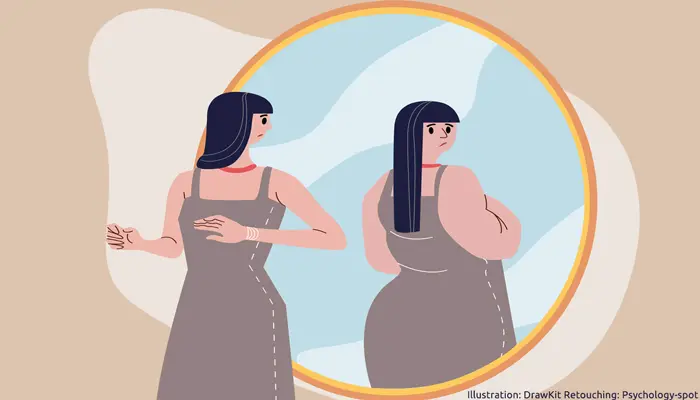
Anorexia nervosa and bulimia are eating disorders that manifest in relatively young women with a paralyzing fear of gaining weight.
If we take a quick look at any gallery where the art of previous centuries is exhibited, we can appreciate that the female beauty model was somewhat diverse, rather plump, entered into flesh.
Today the concept of beauty has changed and, unfortunately, also the incidence rate of eating disorders.
Twenty years ago anorexia was considered an almost exceptional disorder. The population at risk was made up, above all, of women of white skin color and middle or upper class; whose only goal was to keep losing weight. The rate of anorexia among low-class women and oriental or black skin-colored females ranged from 0.4 to 1.5 per 100,000 inhabitants.
Today everything has changed dramatically, the incidence of this disorder has increased in all countries. It currently occurs in all ethnic groups and in both sexes, although the number of affected women is about 10 times greater than that of men.
In Spain, is estimated an overall prevalence of 3 to 7 per 100,000 inhabitants. In 2006, were reported a total of 80,000 cases, of which 500 required hospitalization and more than 100 were fatal.
The ages of greatest risk? 25% of affected people are under 25 years old, while up to three women out of 100 are between 16 and 18 years old. However, alarmingly, the age with which anorexia affects is lowering, today it affects even girls under 10 years old.
Anorexia nervosa symptoms, diagnosis and prognosis
The symptoms? One of the main ones is the loss of the ideal weight in around 15%.
The figures of those affected by anorexia, far from decreasing every day, are increasing.
There are three essential characteristics for the diagnosis of anorexia nervosa, according to the criteria of the DSM-IV, manual of diagnosis of mental disorders:
1. The person refuses to maintain a normal minimum body weight for his height and age.
2. Intense fear of gaining weight.
3. Alteration in the perception of body size or shape.
Another unequivocal symptom is the onset of amenorrhea due to abnormally low estrogen levels.
When is weight considered to be below normal rates? When it is less than 85% of the established norm.
How is body weight decreased? With a very restricted diet that initially eliminates all high-calorie foods, then ends up eating almost all kinds of food. However, some people after eating induce vomiting, misuse laxatives and diuretics, or exercise excessively. In relation to these habits and behaviors, two subtypes of anorexia nervosa are mentioned:
1. Restrictive: Weight loss is achieved by dieting, fasting, or making intense exercise. During episodes of anorexia nervosa, these individuals do not resort to binge eating or purging.
2. Compulsive-purgative: the person regularly resorts to binge eating and/or purging. After bingeing episodes, they resort to purging, causing vomiting or using excessive diuretics, laxatives or clysters. There are some cases that do not binge but usually resort to purging, even after eating small amounts of food.
Does the fear of gaining weight disappear once the “ideal weight” has been reached? No, paradoxically, the fear of gaining weight increases even if the weight decreases because there is an alteration in the perception of body shape. They usually still find parts of their body inadequately obese and use a variety of techniques to weigh and measure different parts of their body. The mirror constitutes the perennial companion.
What does losing weight mean for these people? People who suffer from anorexia usually consider that losing weight is synonymous with extraordinary self-discipline, so they understand weight gain as a loss of self-control.
What psychological consequences does this disorder produces? Depression, including major depression, irritability, insomnia, social isolation and decreased interest in sex, usually occurs with considerable weight loss. The appearance of an obsessive-compulsive disorder, the concern for eating in public, the feelings of incompetence, the need to control the environment, rigid thinking and the decrease in emotional expression and initiative are also frequent.
Although, people who have the compulsive-purgative type of anorexia are more likely to have problems with impulse control so they can abuse alcohol and other drugs and have great emotional lability.
How does this disorder start? Generally, its onset is associated with a stressful event that acts as a trigger for the person.
What is your prognosis? The course of anorexia is very varied, some people fully recover after a single episode while others relapse and are victims of chronic deterioration over the years. Mortality is approximately 10% and is generally caused by starvation, suicide, or electrolyte imbalance.
Sources:
Izquierdo, M. & Avellaneda, A. (2004) Enfermedades raras. Un enfoque práctico. Barcelona: Instituto de Salud Carlos III. Ministerio de Sanidad y Consumo.
Weitzner, A. (2007) El camino hacia la recuperación de la anorexia y la bulimia. México: Pax.



